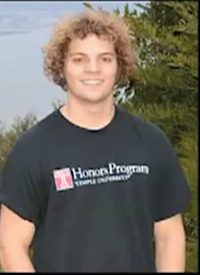
In an exclusive interview with Liberty News Network national correspondent Andy Ramirez, an American university student studying abroad in Tokyo revealed an insider account, including video footage (see below), of what it was really like to live through Japan’s devastating earthquake and its aftermath.
“We were sitting in the computer lab … and all of the sudden our chairs felt like massage chairs and then the building started to sway back and forth,” said Erik Jacobs (left), a 20-year-old U.S. citizen studying abroad in Japan through Temple University. About 30 seconds into the trembling, Jacobs remembered that he had a camera and began to video the experience.
“Girls and guys alike were crying and trembling and they were trying to get a hold of their family members but they couldn’t because a lot of the cell phone lines were down because of the high traffic after the earthquake,” he explained.
After the quake and a powerful aftershock, Jacobs went to a friend’s apartment and turned on the television to find out what was going on. “That’s when we saw … the horrific tsunamis and the chemical-plant fires, and that’s when we knew that Tokyo experienced the earthquake, but it was a lot worse in a lot of other places,” he said. “It was almost surreal just to see all those things happening at one time.”
Jacobs was in New Orleans to help out in the Ninth Ward years after Hurricane Katrina devastated the city. “I thought that was bad down there even several years afterward,” he remembered. But after seeing the tsunami on television from Japan, he asserted, “I knew that this was going to be something that we had never seen before in terms of disasters.”
Commenting on the houses swept out to sea by the tsunami and the massive whirlpool observed after the disaster struck, Jacobs stressed that “it was just terrible, and we were all very lucky that we weren’t a part of that in the Sendai region.” Tokyo, despite the perception of many foreigners, was left without major damage after the quake, largely because of intelligent building construction designed to withstand major shaking.
But Jacobs observed that Japanese media coverage was “concerning” and that he and his friends were not sure what to believe — especially regarding the events at the Fukushima nuclear power plant. “I’m just very happy and thankful that I wasn’t 150 miles north and east of the city, because things could have been a lot worse,” he noted.
But despite his distance from the epicenter of the disaster, Jacobs reflected that the experience still changed him, explaining,
I used to complain about a lot of smaller things, but after experiencing this earthquake and dealing with the aftermath of it and having to change things — you know, it took me three and a half hours to walk home asking for directions in Japanese — I think it helps put things in perspective for me. … I can’t control everything, and I just need to take control of what I can control.
Jacobs also related that the entire horrific experience had given him a greater appreciation of his family.
Several days after the quake, following a trip to the airport that took six hours because of problems with the public transportation system, Jacobs was finally on his way back to America. “It was a big relief to be on that plane as soon as we left the ground,” he declared, noting that though he was sad to leave Japan, it was a necessary decision.
“Everybody needs to know that there are tens of thousands of people that are affected extremely negatively right now by the situation,” Jacobs concluded. “Even when the TV cameras stop showing that here in the U.S., that situation is going to be there for years to come. We just need to be thinking about those people and doing whatever we can to help [them]. … It‘s very bad there and I don‘t know when it‘ll be getting better — it‘ll probably be a very long time. My thoughts are with them.”
Watch the interview, including the video footage captured by Jacobs, below:



